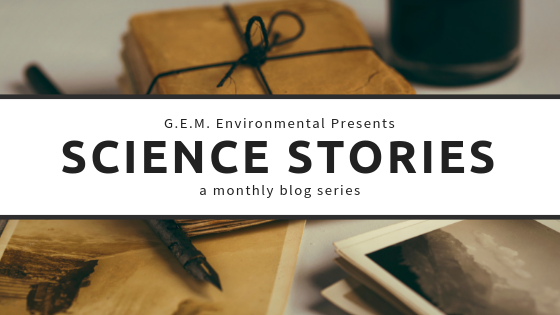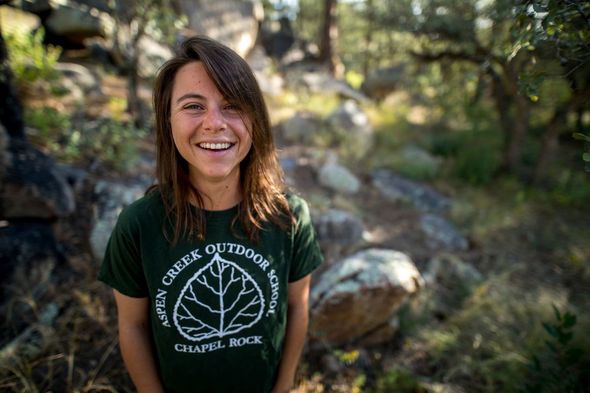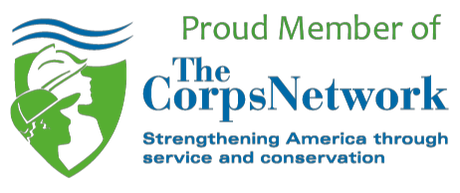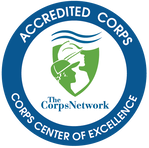|
G.E.M. Environmental is excited to share another new addition to our monthly blog series - Science Stories. Each month, we interview a STEM scholar, student, or community member and ask them things like why they believe the STEM fields are important, how they got started in their field, to what they would do if they hit the jackpot. We hope that our new blog series will inspire, introduce a variety of fields, and create new conversations. Our guest this month is Sarah Vincent, Director of Outdoor Education at Chapel Rock's Aspen Creek Outdoor School, a residential "Science Camp" where school groups participate in safe, fun, and educational activities in a camp setting. Sarah has a B.S. in Earth Science from George Mason University and is currently an M.Ed. student at Prescott College. She has been working in the science and outdoor education fields since 2009. Why do you believe that the STEM fields are important? At the core of science is the inquiry process; a process that I believe is foundational to innovation, democracy, self-esteem, and knowledge. The skills of asking questions about how things work, making observations and researching, forming hypotheses rather than opinions, designing and performing experiments, drawing conclusions and communicating them...these are all skills worth practicing, in any order, at any time. Then repeat. STEM fields are one avenue to use these skills as a means of contributing to society. How and why did you get involved in the STEM fields? I thought a scientist was a tall man in lab coat, that was born a genius, working independently, in a shiny laboratory. I didn't know that building "gnat catchers" in the backyard was engineering, counting rings on snail shells was math, and messing with ant colonies was science. When I saw polar bears at the zoo, and learned about scientists like Jane Goodall, my image of science changed, and so did my interests. How I got involved in STEM was by working hard (I was not born a genius…or tall for that matter), openness to opportunities, collaboration with others, and serendipity. Why I got involved includes a desire to turn the images of “scientist” and “science” on their heads, so as to create a more inviting and inclusive field for all. O and I love it! What is another aspect of your life or career that is influenced or enriched by the STEM fields? When I go hiking, camping and/or backpacking, I find that my science background adds another level of enjoyment for me. One example is hiking up and seeing the biomes change. Noting for example, the last yucca, or saguaro, as you ascend. What inspires you in your current position? I am fortunate enough to experience something inspiring every single day at work; watching a group build a cube out of PVC pipe faster and faster, seeing a student’s face when they learn a snake is not slimy by touching one for the first time, hearing students bargain over who gets to take home the rodent bones after owl pellet dissection…etc. However, most transformative for me, is hearing teachers express surprise when certain students come up to Science Camp and thrive, while back in the classroom they are challenged, or act out, or are disengaged. This inspires me because it means we’re connecting with students that might otherwise be slipping through the cracks of a traditional math or science classroom. Have you ever participated in an internship? I was an undergraduate intern at the Environmental Studies on the Piedmont in Warrenton, VA. I monitored bluebird boxes for a couple of semesters. In this time, I was also an intern with the Northern Virginia Soil and Water Conservation District. Both internships changed my life. I met mentors, and inspiring people in the field that had invaluable information about what a STEM job is and how to get there. What work experiences have been the most educational for you, and why? The most educational work experiences have been the ones outside my comfort zone, right on the border of panic. “Camp life” and “outdoor education life” require a more holistic approach to work, than with other jobs I’ve had. There is no “off the clock” and there is little predictability in how a day might turn out. We work long hours, one minute cleaning up vomit, and the next searching for the tree an autumn leaf came from. Full immersion in science and science education is where I learn the most. What project(s) are you currently working on?
One ongoing project is keeping our curriculum up-to-date with the public schools, relevant, adaptable to the outdoors, and fun. This means we’re always working on it. Another area of growth that we’re researching, is incorporation of service learning and citizen/community science into science curriculum, as a way to deepen connections and promote life-long learning. Lastly, we work primarily with schools from the greater Phoenix area. Currently, we are working on partnering with local Prescott schools, and the Prescott community at large, in a greater capacity. What is something that people might be surprised to learn about you? Since moving out west, I have spent over 350 nights out in the high desert under the stars. In this time, I have developed an interest (not expertise) in the cultural landscape of the desert and how it interfaces with the natural landscape. The centers and crossroads of people in the four corners region, today and thousands of years ago, have much to teach us about ecology, geology, and beyond. What is the funniest thing that has happened to you recently? Listening and watching my co-worker describe watching a cottontail do its “morning” stretches. What is the worst job that you had, and what would you tell your past self now? Every job has its ups and downs, and I am grateful for all of it. I cannot name one worst job. However, one of my worst days on the job involved stepping in human feces while wearing “opened” shoes, as a result of lack of Leave No Trace. If I could talk to myself that day I would say; “Keep on keepin’ on…this too shall pass…all in a day’s work…if it wasn’t work, we’d call it play.” You won $10 million in the lotto. What would you do? I would buy a camp to be used for outdoor science education, complete with a state-of-the-art field lab, and pump the rest of the money into reducing, or eliminating costs for low-income school districts. I’d also buy two pack rafts and fly my brothers out to Arizona to adventure for a couple of weeks. What’s your favorite book of all-time? Honestly, the Dark Tower series by Steven King. On a more intellectual/spiritual side, The Alchemist by Paulo Coelho. I like stories about journeys. ~~~ Thanks for sharing, Sarah! We enjoyed learning more about Chapel Rock and your fun projects. In case you missed last month's post with Lisa Sahady, click here. Check back next month for more Science Stories. Want to be featured? Contact us. |
Categories
All
Archives
June 2024
|
G.E.M. Environmental NFP
Geology - Engineering - Minerals - Environmental - Not for Profit
Geology - Engineering - Minerals - Environmental - Not for Profit
Community Partners
|
Programs
|
Get Involved
|
About
|
Follow Us
|
Sponsors & Donors
|
© COPYRIGHT 2017 - 2023. ALL RIGHTS RESERVED. G.E.M. Environmental NFP
GEM Environmental, GEM4STEM, GEM Corps, and Charity Rocks are all Registered Trademarks of G.E.M. Environmental NFP.
Any and all use of Trademarks or Copyrights must be authorized.
GEM Environmental, GEM4STEM, GEM Corps, and Charity Rocks are all Registered Trademarks of G.E.M. Environmental NFP.
Any and all use of Trademarks or Copyrights must be authorized.





 RSS Feed
RSS Feed


